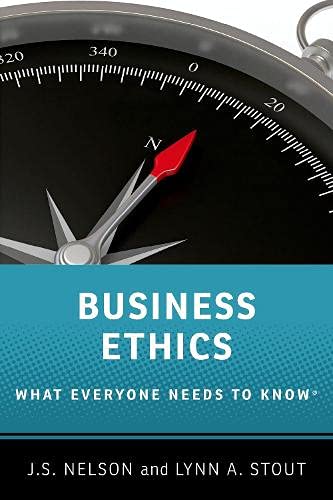Andrei Rogobete: “Business Ethics: What Everyone Needs to Know” by J. S. Nelson and Lynn A. Stout

Business Ethics: what everyone needs to know by Josephine Nelson and Lynn Stout brings a distinctive angle to the discussion by interweaving the field of business ethics with components of law and legal practice. It also branches out into wider peripheral subjects such as philosophy, psychology, and organisational management. Josephine Nelson is Professor of Law at the Charles Widger School of Law at Villanova University, she specialises in how legal frameworks affect individual behaviour within organizations. The late Lynn Stout was Distinguished Professor of Corporate & Business Law at Cornell Law School. Her previous book, The Shareholder Value Myth was also reviewed on this website and proved to be a popular choice amongst our readers.
The ambition of the book is laid out from the onset – that is, to survey “not only moral philosophy, behavioural science, economic principles, and other contributions, but to make business-law concepts accessible and understandable to businesspeople and students of law, business, and ethics” (page xi). Fortunately, the language of the book fulfils this aim. It is clearly written and accessible to the layperson and makes only limited use of technical jargon. In instances where more specialised terms are indeed discussed (particularly in chapters referring to legal concepts), ample explanation is usually provided to assist the reader.
The book is comprised of 15 chapters and whilst at first glance may appear to be long, one third of its contents (168 pages of 513) are dedicated to an appendix of “Additional Resources and People You Can Reach Out To” (including notes). As the title suggests, the appendix offers additional resources and information for those wishing to delve deeper in the subject – some readers will certainly find this useful.
Chapters 1 through 4 open the discussion by focusing on the broader field of business ethics itself, which is defined as a “…set of moral principles that govern behaviour in a specific sphere of life: the world of business” (page 1). The authors dismiss the popularised idea that business is a cut-throat environment where individuals seek their self-advancement at the expense of others. They view this as “…misleading and inaccurate” whilst acknowledging that “…there are instances of bad behaviour” (ibid). Yet these instances are not dissimilar to other areas of life but just happen to also be occurring in the world of business. The majority of people in the private sector “…will tell you that sound ethics are integral to a successful business career” (Ibid). The book goes on to elaborate why it might be beneficial for a business to think and act ethically. The premise here is the ethics within an organisation not only benefit the organisation itself and its employees but the wider array of stakeholders and indeed society itself – ethics has a multiplier effect.
Chapters 5 through 10 bring in elements of law and legal practice and take a more practical approach to applying them in specific business scenarios. For instance, Chapter 5 addresses questions such as: “What does it mean to owe a legal duty to a partner or other natural person?” (page 61), “When do I have a duty of obedience?” (page 68), “What are duties of confidentiality?” (page 79), “What are disclosure duties?” (page 83). Perhaps more interestingly, the last question asked is “Why should businesspeople act more ethically than the law requires? Isn’t the law enough?” (page 85). The response here is that the law is simply not sufficient to promote and ensure a positive ethical business culture. In some situations it can even be the case that, “legal requirements are not ethically correct” and that “ethically correct decisions are not legally required” (pages 85-86). So there is a lot of material and food for thought in these chapters – readers who are interested in legal matters will find them particularly useful.
Chapters 11 to 15 conclude with a discussion on “How to institute best practices” (chapter 13) and “Designing an ethical culture” (chapter 14). The book emphasises the need for and importance of robust “compliance and ethics programmes” and argues that most effective ones are driven by five key principles: strategy, risk management, culture, speaking up and accountability (page 281). The importance of a “speaking up” culture is stressed in arguing that it is the key indicator of an organisation’s moral environment because it reveals, “…what it feels like to work within the company, and what employees truly understand their organisation’s expectations to be” (page 291).
The book achieves a great deal: First, it provides a comprehensive and for the most part, compelling insight into how legal matters affect ethics in business. Second, it offers practical advice on what can be done to institute an ethical culture and prevent companies from falling into organisational malaise. Third, it succeeds at remaining accessible to both the practitioner and layperson alike. However, the book is not immune from weak points. Perhaps the most evident of these is found in Chapter 3 where the aim is overly ambitious and misses the mark. In under 12 pages, the chapter attempts to integrate major philosophical schools of thought and their relation to business ethics – these include, Aristotle’s virtue ethics, Kant’s categorical imperative, Rawls principles, communitarianism and utilitarianism. The result is an inevitably shallow account that is peppered with overgeneralisations. The book’s account of Kant’s categorical imperative is perhaps the most acute example of this which will no doubt leave some readers disappointed, and others rather perplexed.
Despite these shortcomings, Business Ethics: what everyone needs to know is a worthwhile read for those with an interest in business ethics, legal matters, and the interplay between the two. While it is predominantly aimed at business and legal practitioners, those outside the field will find it thought-provoking and worthwhile.
“Business ethics: what everyone needs to know” by J. S. Nelson and Lynn A. Stout was published in 2022 by Oxford University Press (ISBN: 9780190610289, 019061028X). 513pp.
Andrei E. Rogobete is the Associate Director of the Centre for Enterprise, Markets & Ethics. For more information about Andrei please click here.

